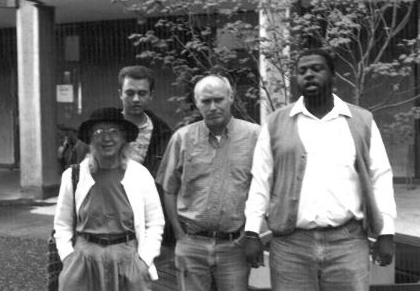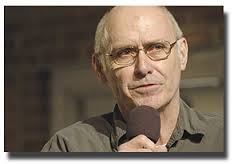A Reflection on Michael Stoops of NCH


The first thing I did when I became the Director of NEOCH in 1995 was call Michael Stoops at the National Coalition for the Homeless and talked to him about civil rights for those who did not use the shelters. We were engaged in a series of lawsuits that began before I was a member of the Coalition, so I needed a tutorial. Michael was a quiet man who was a peacemaker. He never asked for the spotlight but accepted it to save the National Coalition for the Homeless. Sitting down and looking for a solution with a group of persecuted homeless people was the way he wanted to spend his afternoons. Michael Stoops passed away on May Day 2017 after a two year struggle following a stroke.
Stoops grew up in Indiana and moved to Portland, managing a shelter in the 1970s. Stoops loved sitting in the office and helping to distribute the donated food on Sunday afternoon to the forgotten and downtrodden. He helped organize the Housing Now march in DC, provided input on the McKinney Vento national funding of shelters, and helped found the National Coalition for the Homeless. Stoops was a community organizer with a keen ear for listening to homeless people. He had experienced homelessness and hunger and slept at the CCNV shelter in DC in the past. He knew what it meant to be swept off the streets, and he cared about the intrinsic value of every human being. He understood that each person had their talents and a place in our society. He rarely wore a sport coat and was often confused for the homeless individuals that City Councilmembers and Congressional staff walk over on their way into their offices.

Michael loved bringing people together and working to raise the voice of those who slept outside with his quiet but powerful voice. He stepped up to write grants, send in payroll, complete the 990 tax return and manage a VISTA program because he had to in order to keep the organization functioning. Stoops met with funders and in his soft spoken style asked them to open their checkbooks to help in a non-traditional manner. It was not money to buy food, housing, a shelter bed or clothing; he was asking for a donation for social change. That is the hardest thing to try to get across in an elevator speech, but Michael never lost his thirst for righteousness.
Michael took on the executive director position at NCH when I was a board member. It was a temporary interim appointment for the summer that lasted for years. He testified before Congress, always yielding time to others who had slept on the hard sidewalks of America's streets. Stoops worked for NCH when it was a large vibrant organization with 20 staff and he helped to unionize that staff. He saw it crippled by the downturn and the loss of prestige and influence. Michael put in place a speaker's bureau that has become a mainstay of NCH programming. The speakers under Michael's guidance taught other formerly homeless people to overcome their nervousness to talk at colleges, high schools and religious gatherings to put a face on homelessness. We will never know how many shelter workers, volunteers, health care professionals or housing developers were inspired by Michael to work to reduce poverty in the United States. I met a doctor at the CDC in Atlanta who was inspired to work in the area of TB after listening to Michael Stoops at a college class.
Stoops loved the street newspaper movement and helped to keep many street newspapers in business, planting the seeds of a few others. The best street newspaper in the United States, Street Sense in DC, was founded by Stoops and NCH's director at the time, Donald Whitehead. The paper has remained close to Michael and he continued to act as a mentor to Street Sense and many of the vendors in our nation's capital. There are thousands of newspaper vendors who were able to make the rent or pay for dental work because of Michael. He loved to empower individuals willing to try to sell free speech on the cold, rainy, harsh mean streets of America.
Michael came to Cleveland on a few speaking engagements and to help with the North American Street Newspaper Association conference at Case Western Reserve University in the late 1990s. He helped to get the Canadian and US papers together and host listening and learning sessions in various cities. He organized newspaper conferences in Seattle, San Francisco, Cleveland, Boston, Montreal, Edmonton, and Chicago that I was able to attend. He always helped homeless people attend the conference and hosted a series of vendor competitions to see which vendor would sell the most papers in a foreign city. One of our vendors dressed as a cow (with cow head) on the plane to fly to Edmonton to get that extra edge in the vendor competition. This was pre-September 11th. You can't dress as a cow on a plane anymore, but she won. Even back in the late 1990s and early 2000s it was hard to get homeless people with problematic backgrounds across the US/Canadian border, but Michael handled it.

He lived, breathed and voraciously ate up the news about homelessness and poverty from around the US. Michael would read nearly every major newspaper everyday and that dramatically expanded when he got access to the internet. He knew as much about the sweeps taking place in San Diego as the local Coalition just from the news accounts and the telephone. Stoops would call us in the field and get an update on the status of a lawsuit or negative encounters with the police when he heard about a problem. He knew more about the struggles facing homeless people in America than every board member in the 30 year history of the Homeless Coalition in Cleveland combined.
Michael would put us in contact with a homeless person in some of the rural communities two or three hours outside of Cleveland who happened to call the NCH office for help. Homeless people, advocates and service providers could call Michael day or night and they would get a response. They could call about being arrested or threatened by the police and he would get them a local contact who might help. The religious groups would call to tell Michael that the police did not want to serve a hot meal to a homeless person and he would hook them up with a lawyer friend of his. Michael worked with health care advocates to read the names of those who had passed away on the first day of winter. That somber service is done at every major city in Ohio and hundreds of cities in the United States thanks to Michael and the National Health Care for the Homeless.
 This is a great picture shared by Jerry Jones, former director of NCH on TwitterStoops heard about those horrible videos (remember video tapes?) of homeless people fighting that were being sold at major retailers and went to war. In the most meek and understated way possible, he successfully fought to get every major retailer to stop selling for profit these horrible tapes. He asked Sean Cononie of Florida to take on Dr. Phil and condemn the awful people who were making money off other's mental health or addiction issues. This was one of the benefits of Michael's long career; he had allies who would support him throughout the country. Michael appeared on the Colbert Report, CNN and many other news programs. He was the reluctant face of national homeless advocacy in the United States. Stoops understood the tremendous weight on his shoulders to carry the horrific stories of violence, crime, poverty and a lack of education that people overcame in order to find stability. I never knew if he was mourning or praying or just trying to process the tragedy that he saw on a daily basis, but he was a deep thinker.
This is a great picture shared by Jerry Jones, former director of NCH on TwitterStoops heard about those horrible videos (remember video tapes?) of homeless people fighting that were being sold at major retailers and went to war. In the most meek and understated way possible, he successfully fought to get every major retailer to stop selling for profit these horrible tapes. He asked Sean Cononie of Florida to take on Dr. Phil and condemn the awful people who were making money off other's mental health or addiction issues. This was one of the benefits of Michael's long career; he had allies who would support him throughout the country. Michael appeared on the Colbert Report, CNN and many other news programs. He was the reluctant face of national homeless advocacy in the United States. Stoops understood the tremendous weight on his shoulders to carry the horrific stories of violence, crime, poverty and a lack of education that people overcame in order to find stability. I never knew if he was mourning or praying or just trying to process the tragedy that he saw on a daily basis, but he was a deep thinker.
Michael would fly to Florida to testify against a restriction on churches serving food on the beach and then to Austin to argue that disabled people should be able to rest on park benches, then to San Francisco to try to breathe some compassion into a City Council trying to restrict begging for money. Homeless people living in the big shelters in Boston or St. Petersburg knew of Michael's efforts, and he tried to bring justice to Covington Kentucky with the forgotten homeless guys sleeping in abandoned farms who were finding it impossible to get into housing with their criminal background. He gave of himself everyday to help those forgotten by capitalism. Michael was poor of spirit, and was always trying to lift those around him. He did not raise his voice and was merciful even to those he disagreed with or those who he felt were doing harm.
I think that the most significant legacy from Michael's work came toward the end of his career in 2014: after years of Hate Crimes reports published; after years of publishing Criminalization reports documenting all the municipal laws passed to hide homeless people; and after all the meetings with hundreds of Congressional staff members, the Justice Department added their voice to a police sweeps case out of Boise Idaho. This was important because for the first time someone in the national government put down on paper what we in the field have known for decades: local policies on homelessness are crazy. How can a city not offer enough beds to everyone who shows up for help, and then turn around and give a ticket to those who sleep on the streets? The Obama administration said it was immoral to not offer enough shelter and then paradoxically arrest those who cannot find a shelter bed. This was the Bell vs. the City of Boise lawsuit over the police sweeps of homeless people, but it should be called the life's work of Michael Stoops.
I will miss Michael everyday. The struggle to end homelessness has taken a hit that will be take years to recover.
Brian Davis
Posts reflect the opinion of those who sign the entry.
